Pressure Washing Barnesville
Find the best Deck and Fence Cleaning in Barnesville
Receive up to 3 Power Washing quotes for your project today! Compare profiles, reviews, accreditations, portfolio, etc... and choose the best offer.
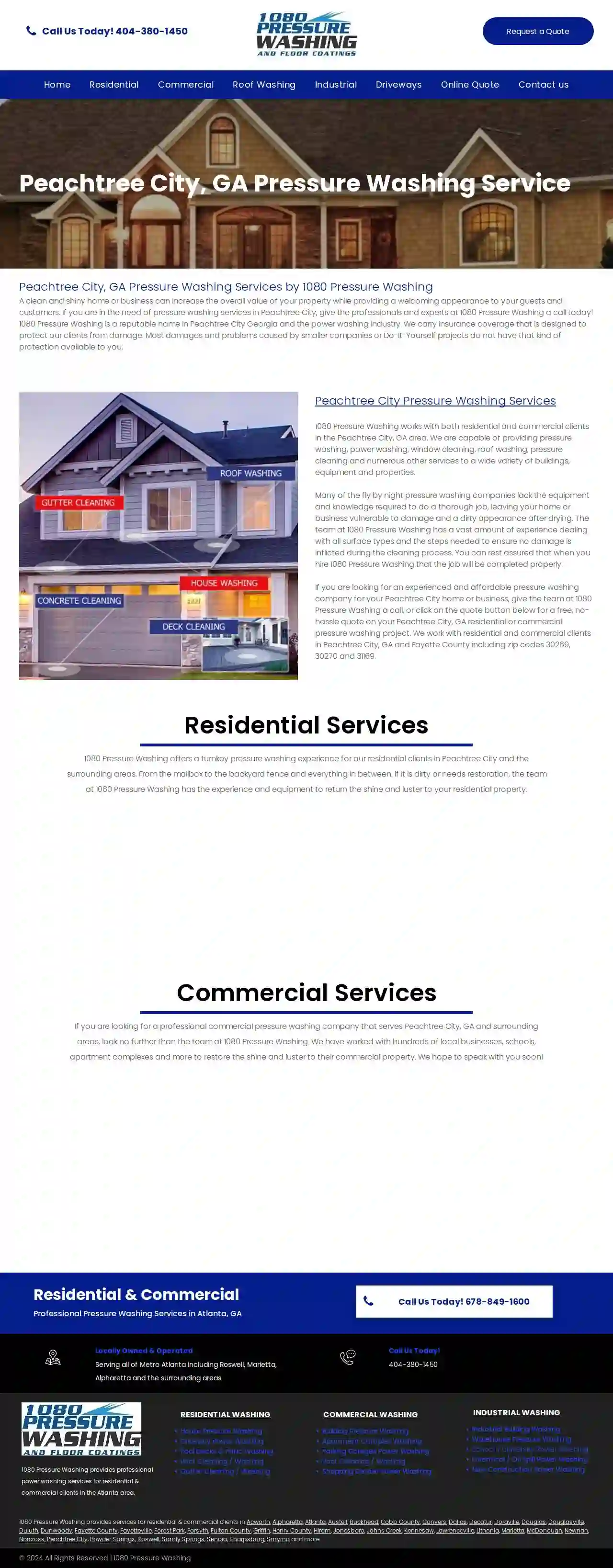
1080 Pressure Washing and Roof Washing LLC
58 reviewsAtlanta, 30303, US1080 Pressure Washing of Atlanta is a locally owned company that provides professional pressure washing services for residential, commercial and industrial clients. We have worked with hundreds of residential, commercial and industrial clients to provide an answer for their power washing needs. From driveways to downtown Atlanta high-rise buildings, our team has handled it all. If you are looking for a pressure washing company that serves Atlanta and the surrounding areas, we invite you to explore all that our company has to offer. We are competitively priced and one of the premier Atlanta pressure washing companies. We look forward to the opportunity of speaking with you soon!
- Services
- Why Us?
- Gallery
Get Quote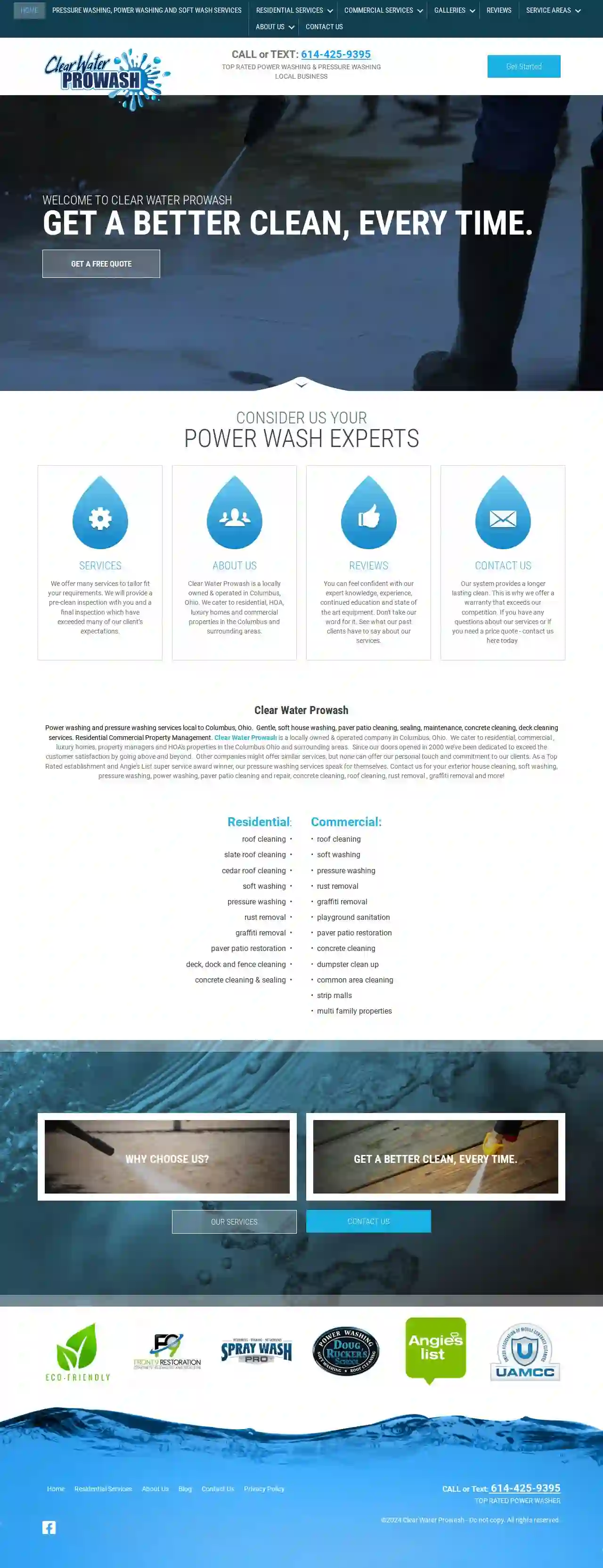
Clear Water Prowash
5125 reviewsColumbus, USWelcome to Clear Water Prowash Get A Better Clean, Every Time. Get a Free Quote Consider Us Your Power Wash Experts Services We offer many services to tailor fit your requirements. We will provide a pre-clean inspection with you and a final inspection which have exceeded many of our client’s expectations. About Us Clear Water Prowash is a locally owned & operated in Columbus, Ohio. We cater to residential, HOA, luxury homes and commercial properties in the Columbus and surrounding areas. Reviews You can feel confident with our expert knowledge, experience, continued education and state of the art equipment. Don't take our word for it. See what our past clients have to say about our services. Contact Us Our system provides a longer lasting clean. This is why we offer a warranty that exceeds our competition. If you have any questions about our services or if you need a price quote - contact us here today. Clear Water Prowash Power washing and pressure washing services local to Columbus, Ohio. Gentle, soft house washing, paver patio cleaning, sealing, maintenance, concrete cleaning, deck cleaning services. Residential Commercial Property Management. Clear Water Prowash is a locally owned & operated company in Columbus, Ohio. We cater to residential, commercial , luxury homes, property managers and HOA's properties in the Columbus Ohio and surrounding areas. Since our doors opened in 2000 we’ve been dedicated to exceed the customer satisfaction by going above and beyond. Other companies might offer similar services, but none can offer our personal touch and commitment to our clients. As a Top Rated establishment and Angie's List super service award winner, our pressure washing services speak for themselves. Contact us for your exterior house cleaning, soft washing, pressure washing, power washing, paver patio cleaning and repair, concrete cleaning, roof cleaning, rust removal , graffiti removal and more!
- Services
- Why Us?
- Gallery
Get Quote
Cleantech
4.717 reviewsColumbus, OH, 9118 Antares Ave, 43240, USAt Cleantech Power Washing, we specialize in bringing the brightest and cleanest surfaces to life, combining modern, effective techniques with a commitment to customer satisfaction. With over two decades in the power washing industry, we’re experienced and dedicated to delivering top-notch residential and commercial cleaning at highly competitive rates. Whether it’s a house facade, the exterior of a commercial property, or a parking lot, our team is here to improve the exterior of your property and enhance its curb appeal.
- Services
- Why Us?
- Accreditations
- Our Team
- Testimonials
- Gallery
Get Quote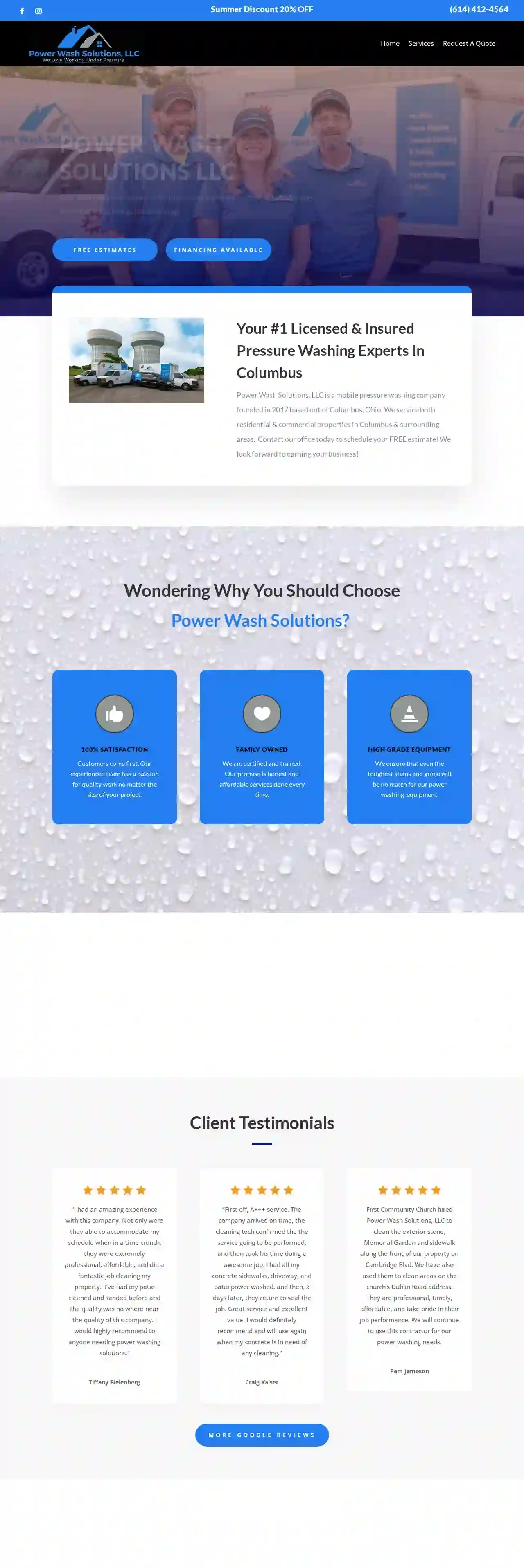
Power Wash Solutions, LLC
586 reviewsColumbus, USPower Wash Solutions, LLC is a mobile pressure washing company founded in 2017 based out of Columbus, Ohio. We service both residential & commercial properties in Columbus & surrounding areas. Our experienced team has a passion for quality work no matter the size of your project. We are certified and trained. Our promise is honest and affordable services done every time. We ensure that even the toughest stains and grime will be no match for our power washing equipment. Contact our office today to schedule your FREE estimate! We look forward to earning your business!
- Services
- Why Us?
- Testimonials
- Gallery
Get Quote
Brook Pressure Washing Inc.
5620 reviewsTampa, FL, 123 Main St, 33647, USAt Brook Pressure Washing, we pride ourselves on providing unmatched pressure washing services to residential and commercial properties in the Tampa Bay area. Our team of experts uses the latest technology and eco-friendly cleaning solutions to leave your property looking like new. From roof washing to patio and deck cleaning, we offer a range of services to meet your unique needs. Contact us today to schedule your free quote and experience the Brook Pressure Washing difference.
- Services
- Why Us?
- Accreditations
- Gallery
Get Quote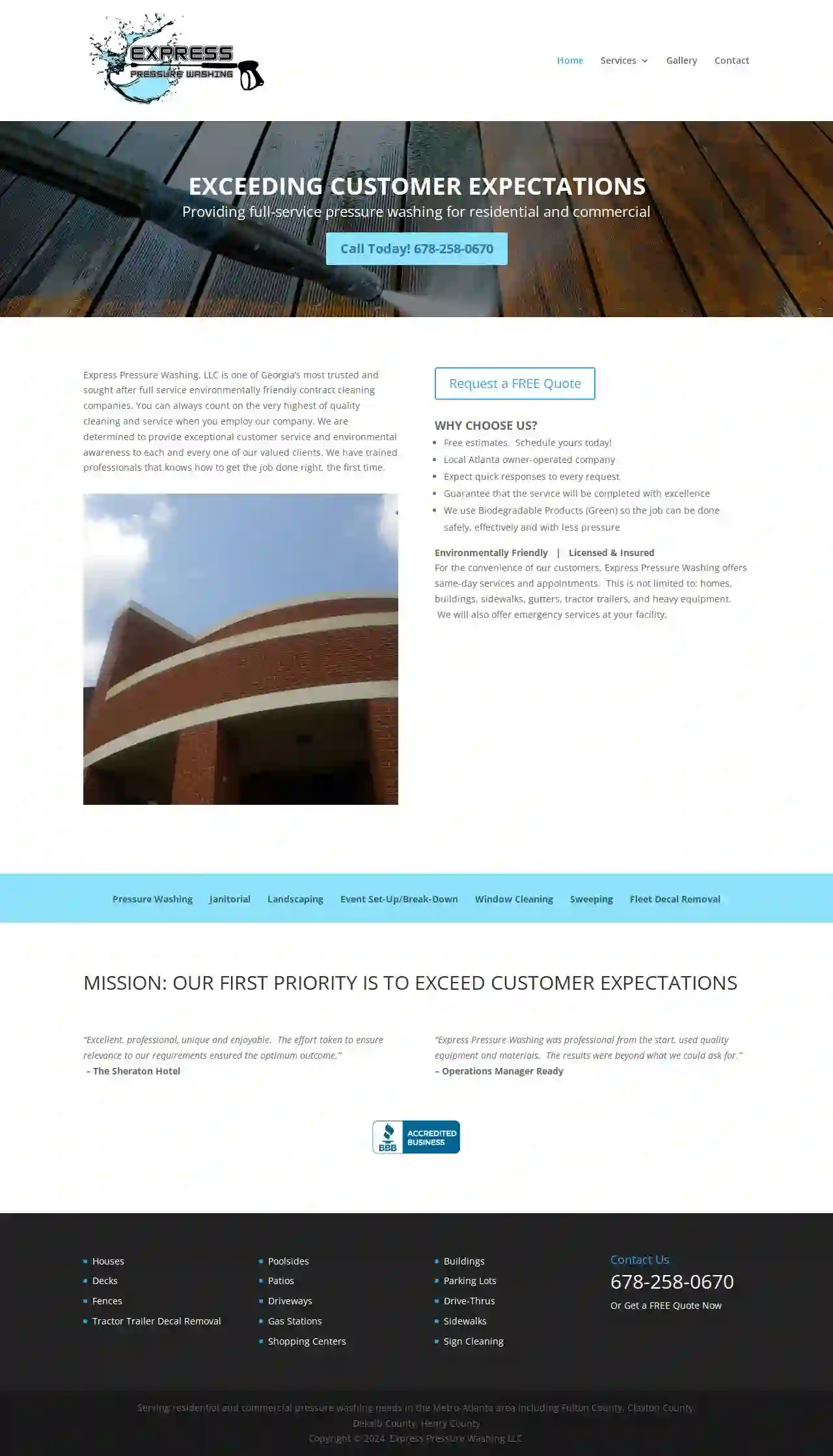
Express pressure washing llc
51 reviews123 Main St, Atlanta, 30301, USExpress Pressure Washing, LLC is one of Georgia’s most trusted and sought after full service environmentally friendly contract cleaning companies. We are determined to provide exceptional customer service and environmental awareness to each and every one of our valued clients. We have trained professionals that knows how to get the job done right, the first time.
- Services
- Why Us?
- Accreditations
- Our Team
- Testimonials
- Gallery
Get Quote
Pro House Wash of Augusta
5125 reviews4308 Regans Lane, Augusta, GA, 30909, USPro House Wash of Augusta is Augusta's go-to source for all things pressure washing! Home or business, we do it all and do it well. If you're looking to give your property a boost on ad budget, don't settle for anything less than the best. Pro House Wash of Augusta extensive in-field experience, knowledge, and the latest equipment ensure customers will get premium results they're going to love every time they call us.
- Services
- Why Us?
- Accreditations
- Our Team
- Testimonials
- Gallery
Get Quote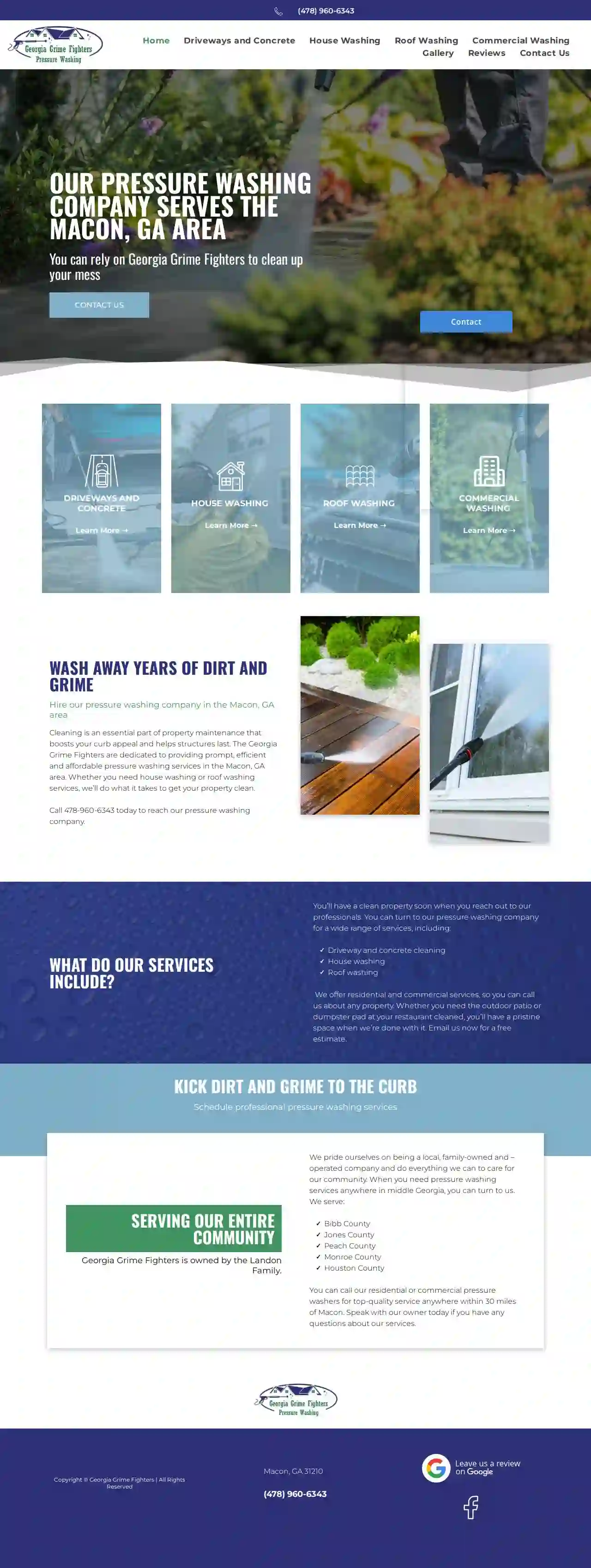
Georgia Grime Fighters, LLC
510 reviewsMacon, 31210, USGeorgia Grime Fighters is a family-owned and operated pressure washing company serving the Macon, GA area. We are dedicated to providing prompt, efficient and affordable pressure washing services. Whether you need house washing or roof washing services, we’ll do what it takes to build your trust and get your property clean. We offer a wide range of services, including concrete cleaning, driveway cleaning, house washing, soft washing services, roof washing services, roof cleaning, commercial pressure washing, and parking lot cleaning. We serve Bibb County, Jones County, Peach County, Monroe County, and Houston County. Call us today for a free estimate!
- Services
- Why Us?
- Our Team
- Testimonials
- Gallery
Get Quote
Alpha Pressure Washing
522 reviewsAtlanta, USWelcome to our home page. We are Marietta's premier exterior surface cleaning company and we serve clients in Marietta and the surrounding areas. We also work with local property management companies and homeowners associations. Our pressure washing company provides first-rate exterior surface cleaning services for reasonable prices and customer service that is second to none. Our pressure washing company is comprised of a team of experienced and dedicated professionals with a high level of expertise in cleaning a variety of exterior surfaces including brick, stone, concrete, asphalt, wood, siding and more. Whether you need pressure washing for the exterior of your home or building, your sidewalks, your driveway, a deck, a pool area or a patio, our professionals can get them looking like new again. The Best Pressure Washing Services When it comes to residential pressure washing and commercial pressure washing, both the equipment and the person operating it are very important. The experts from our pressure washing company know just how much pressure to apply to different types of exterior surfaces to get them sparkling clean without damaging them in the process. Our company has purchased top quality pressure washing equipment that enables our staff to carefully control the amount of pressure being used to safely and effectively get surfaces sparkling clean. The employees from our Marietta pressure washing company are highly trained and are both friendly and professional. If you hire us to clean your exterior surfaces, we will treat you and your property with care and consideration. Reliable Pressure Cleaning Company Many pressure washing companies come and go, but we have made a commitment to our community. Our exterior surface cleaning company will be here to serve you for many years to come. If you give us the opportunity to clean your exterior surfaces, we will work hard to earn your respect, your repeat business and your referrals. If you are looking for a pressure washing company that provides first-rate exterior surface cleaning services at reasonable prices and delivers customer service that is second to none, please contact our Marietta Pressure Washing Professionals today. You will be amazed how good your exterior surfaces can look!
- Services
- Why Us?
- Testimonials
- Gallery
Get Quote
Neptune Pressure and Soft Wash
51 reviewsDecatur, 30030, USNeptune Pressure and Soft Wash LLC revitalizes your home or business with professional pressure washing services. We offer a wide range of exterior cleaning services to meet your specific needs, from pressure washing to soft washing. Neptune Pressure and Soft Wash is a local pressure washing company with over 25 years of combined experience. We specialize in providing top-quality exterior cleaning services to both residential and commercial clients. We service Decatur, GA and surrounding areas.
- Services
- Why Us?
- Gallery
Get Quote
Over 60,241+ Cleaning Services in our network
Our janitorial contractors operate in Barnesville and surroundings!
CleaningMatch has curated and vetted the Best Janitorial Services arround Barnesville. Find the most reliable pro today.
Frequently Asked Questions About Pressure Washing
- Driveways: Removes oil stains, tire marks, dirt, and grime, restoring the appearance of concrete, asphalt, or paver driveways.
- Decks and Patios: Cleans wood, composite, or concrete decks and patios, removing dirt, mildew, and algae, and preparing them for staining or sealing.
- Fences: Revitalizes wood, vinyl, or composite fences, removing dirt, grime, and weathering, and enhancing their appearance.
- Siding: Cleans vinyl, aluminum, brick, or wood siding, removing dirt, mold, mildew, and other contaminants, and restoring its original color.
- Roofs: Removes moss, algae, and other debris from roofs, extending their lifespan and improving their appearance. Soft washing is typically recommended for roof cleaning to prevent damage.
- Walkways and Sidewalks: Cleans concrete or brick walkways and sidewalks, removing dirt, grime, and stains, and improving safety by reducing slipperiness.
- Brick and Stone: Cleans brick and stone surfaces, removing dirt, mildew, and efflorescence, and restoring their natural beauty.
- Regular Cleaning: Sweep or rinse surfaces regularly to prevent dirt and grime from building up.
- Address Stains Promptly: Clean up spills or stains as soon as possible to prevent them from setting in.
- Trim Vegetation: Keep trees and shrubs trimmed away from surfaces to minimize shade, which can promote mold and mildew growth.
- Apply Protective Coatings: Consider applying protective sealants or coatings to surfaces like decks or fences to repel water and dirt, extending their lifespan and maintaining their appearance.
- Schedule Periodic Pressure Washing: Schedule periodic professional pressure washing to maintain the cleanliness and appearance of your surfaces over time.
- Experience: 'How long have you been in business, and what types of pressure washing projects do you specialize in?'
- Licensing and Insurance: 'Are you licensed, insured, and bonded? Can I see proof of coverage?'
- Equipment and Techniques: 'What type of pressure washer do you use? What cleaning solutions do you use, and are they safe for my surfaces?'
- Safety Precautions: 'What safety precautions do you take during pressure washing?'
- Surface Preparation: 'Will you need to move any furniture or objects before pressure washing?'
- Water Usage: 'Do you use a water reclamation system or other methods to conserve water?'
- Cleanup: 'How do you handle cleanup after pressure washing?'
- Guarantees: 'Do you offer a satisfaction guarantee?'
- References: 'Can you provide references from previous clients?'
What is the difference between pressure washing and soft washing?
Pressure washing uses high-pressure water spray to blast away dirt, grime, and other stubborn contaminants from hard surfaces. It's effective for cleaning driveways, decks, patios, fences, and siding.
Soft washing utilizes low-pressure water combined with specialized cleaning solutions to gently remove dirt, mold, mildew, and algae from delicate surfaces like roofs, siding, and painted surfaces. Soft washing is less abrasive than pressure washing, preventing damage to sensitive materials.
Choosing the appropriate cleaning method depends on the type of surface, its condition, and the desired cleaning outcome. Consult with a professional pressure washing company to determine the best approach for your specific needs.
What surfaces can be pressure washed?
It's important to note that different surfaces require different pressure levels and cleaning solutions. Always consult with a professional pressure washing company to determine the appropriate cleaning method for your specific needs.
What are some tips for maintaining my pressure washed surfaces?
By implementing these maintenance practices, you can prolong the results of your pressure washing and keep your surfaces looking their best.
What questions should I ask a pressure washing contractor before hiring them?
By asking these questions, you can gather valuable information and choose a pressure washing contractor that meets your requirements.
What is the difference between pressure washing and soft washing?
Pressure washing uses high-pressure water spray to blast away dirt, grime, and other stubborn contaminants from hard surfaces. It's effective for cleaning driveways, decks, patios, fences, and siding.
Soft washing utilizes low-pressure water combined with specialized cleaning solutions to gently remove dirt, mold, mildew, and algae from delicate surfaces like roofs, siding, and painted surfaces. Soft washing is less abrasive than pressure washing, preventing damage to sensitive materials.
Choosing the appropriate cleaning method depends on the type of surface, its condition, and the desired cleaning outcome. Consult with a professional pressure washing company to determine the best approach for your specific needs.
What surfaces can be pressure washed?
- Driveways: Removes oil stains, tire marks, dirt, and grime, restoring the appearance of concrete, asphalt, or paver driveways.
- Decks and Patios: Cleans wood, composite, or concrete decks and patios, removing dirt, mildew, and algae, and preparing them for staining or sealing.
- Fences: Revitalizes wood, vinyl, or composite fences, removing dirt, grime, and weathering, and enhancing their appearance.
- Siding: Cleans vinyl, aluminum, brick, or wood siding, removing dirt, mold, mildew, and other contaminants, and restoring its original color.
- Roofs: Removes moss, algae, and other debris from roofs, extending their lifespan and improving their appearance. Soft washing is typically recommended for roof cleaning to prevent damage.
- Walkways and Sidewalks: Cleans concrete or brick walkways and sidewalks, removing dirt, grime, and stains, and improving safety by reducing slipperiness.
- Brick and Stone: Cleans brick and stone surfaces, removing dirt, mildew, and efflorescence, and restoring their natural beauty.
It's important to note that different surfaces require different pressure levels and cleaning solutions. Always consult with a professional pressure washing company to determine the appropriate cleaning method for your specific needs.
What are some tips for maintaining my pressure washed surfaces?
- Regular Cleaning: Sweep or rinse surfaces regularly to prevent dirt and grime from building up.
- Address Stains Promptly: Clean up spills or stains as soon as possible to prevent them from setting in.
- Trim Vegetation: Keep trees and shrubs trimmed away from surfaces to minimize shade, which can promote mold and mildew growth.
- Apply Protective Coatings: Consider applying protective sealants or coatings to surfaces like decks or fences to repel water and dirt, extending their lifespan and maintaining their appearance.
- Schedule Periodic Pressure Washing: Schedule periodic professional pressure washing to maintain the cleanliness and appearance of your surfaces over time.
By implementing these maintenance practices, you can prolong the results of your pressure washing and keep your surfaces looking their best.
What questions should I ask a pressure washing contractor before hiring them?
- Experience: 'How long have you been in business, and what types of pressure washing projects do you specialize in?'
- Licensing and Insurance: 'Are you licensed, insured, and bonded? Can I see proof of coverage?'
- Equipment and Techniques: 'What type of pressure washer do you use? What cleaning solutions do you use, and are they safe for my surfaces?'
- Safety Precautions: 'What safety precautions do you take during pressure washing?'
- Surface Preparation: 'Will you need to move any furniture or objects before pressure washing?'
- Water Usage: 'Do you use a water reclamation system or other methods to conserve water?'
- Cleanup: 'How do you handle cleanup after pressure washing?'
- Guarantees: 'Do you offer a satisfaction guarantee?'
- References: 'Can you provide references from previous clients?'
By asking these questions, you can gather valuable information and choose a pressure washing contractor that meets your requirements.